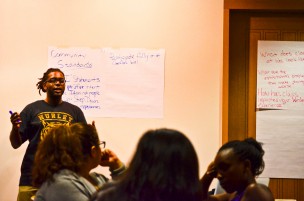 During the fall semester of 2013, Wesleyan Student Assembly (WSA) President Nicole Updegrove ’14 created and organized a five-part series of forums titled Privilege and Policy at Wesleyan, which covered a wide range of topics on campus, including class, race, ability and wellness, gender and religion.
During the fall semester of 2013, Wesleyan Student Assembly (WSA) President Nicole Updegrove ’14 created and organized a five-part series of forums titled Privilege and Policy at Wesleyan, which covered a wide range of topics on campus, including class, race, ability and wellness, gender and religion.
On Thursday, Feb. 2, Updegrove released a report synthesizing over two hundred student and student groups’ contributions from the series. The report has since been referenced in University President Michael Roth’s written report to the trustees and will be included in a presentation to the Board of Trustees this coming weekend.
“I’ve received entirely positive feedback on the final recommendations so far and I can’t thank the facilitators, participants, and editors enough,” Updegrove wrote in an email to The Argus. “While nothing in the report should surprise anyone who has been paying attention to these issues, it is the first time that I know of that so many of the problems have been put together in one accessible document as a way to launch change.”
Vice President for Equity and Inclusion and Title IX Officer Antonio Farias commented on the importance of publishing students’ thoughts in order to effectively change policy.
“You’re having this conversation now on paper, and I love paper,” Farias said. “Wesleyan students are phenomenal at their oral capacities, but it’s like the wind. You can tell me a great idea, and it’s gone. Policy changes when you have paper because that’s what changes bureaucracy. Bureaucracies change when you can create a lasting document that we can go back to.”
Farias applauded Updegrove for pioneering a movement for substantive change in the University setting.
“For students, it might feel like Groundhog Day, and it is, because every four years the team changes and you lose corporate memory,” Farias said. “Corporate memory stays in the institution through the faculty, through the staff, through the administration, but in the student body it regenerates every four years. The wave sort of moves on and we start from anew. That, I think, is what Nicole is doing…. She’s leaving breadcrumb trails for the next generation. That’s what’s really critical.”
The report effectively captured salient points from all five discussion sections, including student quotes, key issues, and recommendations for changes. Recurring throughout the series was the noted general lack of an open, coherent dialogue among students on campus. For many participants, the series was their first opportunity, formal or informal, to discuss issues surrounding privilege and policy at the University.
Updegrove discussed the potential reasoning behind the scarcity of campus discussion.
“Identities around things like class, ability, and religion for many students can be invisible (though they aren’t for everyone) which means that many students aren’t known to be in the minority unless they deliberately choose to share that identity,” Updegrove wrote in an email to The Argus. “That enables the campus to assume that the campus is even more homogenous than it really is, and can leave students pretty isolated from peer support. I also think we all tend to opt out of issues that don’t affect us personally, which leaves a lot of us opting out.”
For each part of the series, facilitators were chosen who had experience and specific knowledge in the topic discussed. Olivia Chavez ’15 and Catherine MacLean ’14, members of Wesleyan Students for Disability Rights (WSDR), organized the section on Privilege, Ability, Wellness and Policy.
Chavez commented on the lack of campus discussion on issues related to disability rights.
“Ability and wellness, in particular, is something that gets overlooked because not everybody can identify as a person with a disability or with a mental issue,” Chavez said. “In the typical population at Wesleyan, most people don’t really think about it, and if they do, it’s a small portion of the student body.”
MacLean furthered Chavez’s point, emphasizing the importance of allowing for open avenues of discussion on campus.
“I really felt that it was a great opportunity to allow students to speak up, just because I think that this is an issue that we don’t talk about at Wesleyan at all, but it’s one that many students are dealing with,” MacLean said. “Ten percent of the student body is registered with the Office of Disability Services, and that’s just the students who would need accommodations in housing or in the classroom. That doesn’t include plenty of students who are living with disabilities.”
Given the success of the five-part series and the distribution of the report, attention will now be focused on encouraging policy changes with the Board of Trustees. Farias commented on the report’s potential for future changes.
“If you can create strategies that outlast your leadership, then you have the ability to make incremental change possible,” Farias said. “And I think [it’s] off to a great start.”
2 Comments
DavidL
““Wesleyan students are phenomenal at their oral capacities . . . ”
Big Talkers.
DavidL
““Wesleyan students are phenomenal at their oral capacities . . . ”
Big Talkers.